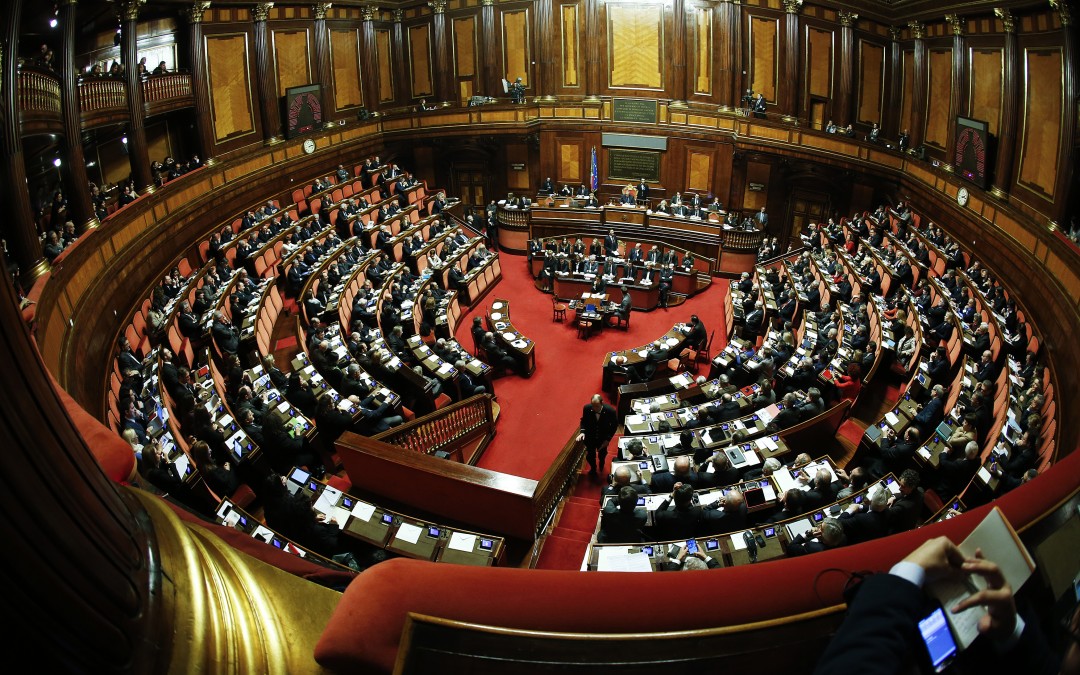IPI urges Italian senate to amend defamation bill Despite positive aspects, measure fails to meet international standards
 Italy’s Prime Minister Matteo Renzi talks during a confidence vote at the Italian Senate in Rome February 24, 2014. REUTERS/Tony Gentile
Italy’s Prime Minister Matteo Renzi talks during a confidence vote at the Italian Senate in Rome February 24, 2014. REUTERS/Tony Gentile
VIENNA, Oct 9, 2014 – With Italy’s Senate preparing for a final vote on a long-pending defamation reform bill, the International Press Institute (IPI) today called on the body’s members to adopt key amendments aimed at bringing the measure in line with international standards on free expression.
As it stands, the bill, which was approved by the Chamber of Deputies last October, would introduce several important changes to Italian defamation law, much of which dates back to the Mussolini era. Most prominently, it would eliminate the possibility of imprisonment — a critical move, given that Italy remains the only European Union member state to routinely sentence journalists to prison for libel. The bill would also cap criminal fines and repeal the offence of aggravated defamation committed against representatives of a political, administrative or judicial body.
However, these positive aspects are overshadowed by the bill’s failure to fully abolish defamation as a criminal offence under both Articles 594 (ingiuria, or insult) and 595 (diffamazione, or defamation) of the Italian Criminal Code and Article 13 of the Law Nr. 47/1948 of Feb. 8, 1948 (hereafter, “Press Law”).
There are other serious deficiencies. Neither the current Criminal Code nor Italian civil defamation law provides adequate defences for defamation in line with international standards, including truth, reasonable publication, and honest opinion, and the Senate bill would not redress that shortcoming. Criminal provisions punishing offence toward the Italian president, head of Government, constitutional institutions, armed forces, and national symbols are left intact.
Moreover, the bill does not cap damages in civil cases, leaving open the possibility of disproportionate awards. Of considerable concern is a proposed change to the Press Law that would allow courts to ban journalists convicted of defamation from practicing their profession from one to six months.
“While IPI recognises that this bill, if passed, would represent a positive step forward for press freedom in Italy, it should be made equally clear that there is substantial room for improvement,” IPI Press Freedom Manager Barbara Trionfi said. “We urge Italian lawmakers to seize the opportunity that this pending bill presents and adopt the necessary legal guarantees to prevent defamation laws from being abused to punish or silence the press.”
According to Ossigeno per l’ Informazione, a leading Italian press freedom watchdog, several amendments have been introduced to the Senate that would address the bill’s numerous weaknesses. One key amendment would decriminalise defamation and insult, as well as tie civil compensation to a number of relevant factors such as a media outlet’s reach or whether the outlet published a correction. Another proposal would strike the ban on journalistic activity.
A separate pair of amendments seek to discourage the use of legal proceedings to intimidate journalists, instances of which have jumped by 50% over the past year, according to Alberto Spampinato, Ossigeno’s director. Under one of the amendments, claimants who are found to have launched a frivolous case would be fined one-tenth of the compensation claimed. Under the other, such claimants would be required to pay compensation to the defendant. (Ossigeno also called this week for reforms to the bill.)
“The Italian Senate should carefully consider proposed amendments to the bill and accept all of those that would strengthen the ability of journalists to report in the public interest,” added IPI Press Freedom Adviser Scott Griffen, who has been coordinating IPI’s work on press freedom and defamation. “We emphasise in particular the need to fully decriminalise defamation, to establish limits on compensation in civil cases, and to otherwise revise civil legislation so that it may not be abused to silence critical reporting.”
According to IPI research, at least eight Italian journalists have been sentenced to prison within the last five years alone. Under Italy’s 1930 Criminal Code, journalists currently face up to three years in prison if convicted of defamation as well as a fine of at least €516. If tried under the 1948 Press Law, offenders risk up to six years behind bars.
Click here for more information on IPI’s work on defamation in Europe.
































